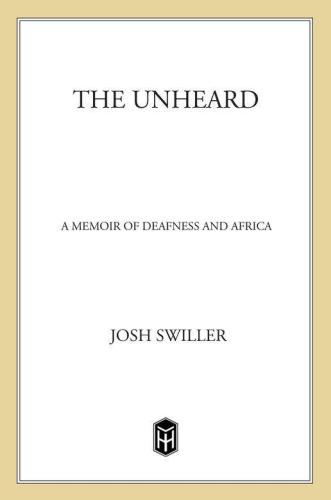
The Unheard
A Memoir of Deafness and Africa
کتاب های مرتبط
- اطلاعات
- نقد و بررسی
- دیدگاه کاربران
نقد و بررسی

July 16, 2007
Although doctors diagnosed Swiller’s deafness early enough to fit him with hearing aids, the young man from Mantattan’s Upper West Side still felt different. As a young adult he drifted from college to college, job to job, relationship to relationship, never quite finding what he was looking for: “a place beyond deafness.” He found that place in the mid-1990s, when the Peace Corps posted him to a remote corner of Zambia. During his two-year stint working in a run-down health clinic in a rural village, he fought for irrigation projects and better AIDS facilities. He befriended a young local who played chess and provided constant counsel in the ways the young white American could—and did—run afoul of local tribesmen (and women) and their age-old ways. Deafness would have provided a unique sensory filter for anyone, yet while Swiller may have his particular aural capabilities, he also has literary talents—an eye, a voice and a narrative talent—in abundance. A story in any other Peace Corps volunteer’s hands might have been humdrum, but in Swiller’s becomes intensified, like the rigors of day-to-day Zambian life, through deprivation.

November 1, 2007
Adult/High School-"Unheard" takes readers into several different worlds: a young deaf mans individualized perceptions, as well as the violence and poverty of a remote African village. It questions the usefulness of outsiders lending a hand to Third World cultures and is a heartfelt description of friendship and personal growth. The prologue describes Swiller and a friend cowering on the living room floor in the dark, armed with nail-encrusted two-by-fours and fighting for their lives. Chapter one, First Day, flashes back to the beginning of the authors journey, when he joined the Peace Corps to become an ambassador to people who may never have seen or met a person from outside their community. His mission was to encourage the locals of Mununga, a village on the shores of Lake Mweru, Zambia, to dig wells and help improve their sanitation and health. Swiller attempted to follow the guidelines provided in his training, but soon discovered that reality and idealism were at odds. As his story progresses, corruption, dishonest village leaders, and a culture he didnt entirely understand all play a part in his coming to terms with his deafness and his understanding of who he was and just what he intended to do with his life. Swillers experiences come to life in a way that teens can and will hear, however metaphorically."Joanne Ligamari, Rio Linda School District, Sacramento, CA"
Copyright 2007 School Library Journal, LLC Used with permission.

























دیدگاه کاربران